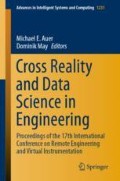Abstract
This contribution is showing ways to overcome issues on the way to digitalized laboratories in engineering education. The results presented in this paper were gained throughout a long-term study: 10 different laboratories were surveyed over a time period of 8 years. A non-standardized survey method was chosen for this evaluation, including a semi-structured guideline with open questions developed during several phases of pre-testing. The didactics and technical concepts of the laboratories are addressed, as well as challenges encountered during implementation and operation.
Key findings of the whole study were identified by looking at didactical set-ups, technical aspects, and project managing topics. Although some aspects of hands-on experiments on-site were easily conveyed into virtual or remote laboratories, others needed to overcome severe impairments. However, personal commitment and financial support were identified as important success factors.
By addressing original learning objectives as well as technical challenges that arose during set-up and digitalization of the laboratories, the results of this contribution clearly emphasize the connection between didactical purposes and technical realization. In some cases, both virtual and remote laboratories needed additional assistance in rephrasing learning objectives and adapting them throughout the process.
Access this chapter
Tax calculation will be finalised at checkout
Purchases are for personal use only
References
GO-LAB (2019). https://www.golabz.eu/. Accessed 23 Aug 2019
LabsLand (2019). https://labsland.com/en/labs. Accessed 23 Aug 2019
TU Berlin: Remote Farm (2019). https://remote.physik.tu-berlin.de/experimente/. Accessed 23 Aug 2019
iLab (2019). https://icampus.mit.edu/projects/ilabs/. Accessed 23 Aug 2019
Winzker, M.: Vision Remote Lab (2019). https://fpga-vision-lab.h-brs.de/weblab/login. Accessed 23 Aug 2019
Lustig, F., Dvořák, J., Kuriščák, P.: Professional and hobby hands-on-remote experiments. In: AIP Conference Proceedings, vol. 2152, p. 030020 (2019). https://doi.org/10.1063/1.5124764
Technical University Ilmenau (2019). https://www.goldi-labs.net/index.php?Site=2. Accessed 23 Aug 2019
University of Cambridge (2019). https://como.ceb.cam.ac.uk/research/weblabs/. Accessed 23 Aug 2019
Institute of Information Engineering, Automation, and Mathematics (2019). http://www.ies.stuba.sk/index.php?menu=3&page_id=22#kolona. Accessed 23 Aug 2019
ELL-ELLI Lab Library (2019). http://www.elli-lab-library.de/index.php/de/. Accessed 23 Aug 2019
Otto-von-Guericke University Magdeburg. Industrial eLab (2019). http://www.elab.ovgu.de/Das+Projekt/Arbeitsplan.html. Accessed 23 Aug 2019
Kaiser, R.: Qualitative Experteninterviews. EP. Springer, Wiesbaden (2014). https://doi.org/10.1007/978-3-658-02479-6
Mayring, P.: Qualitative Inhaltsanalyse. Grundlagen und Techniken. 11., aktualisierte und überarb. Aufl. Weinheim: Beltz (Studium Paedagogik) (2010)
Kruse, D.: [online resource] Virtualisierung eines verfahrenstechnischen Prozesses als remote Labor für die Aus- und Weiterbildung in Industrie 4.0., Diss., Ruhr-University Bochum (2017). http://nbn-resolving.de/urn/resolver.pl?urn=urn:nbn:de:hbz:294-55103
Acknowledgement
This work was supported by the German Federal Ministry of Education and Research under Grant 01PL16082B in the Teaching Quality Pact.
Author information
Authors and Affiliations
Corresponding author
Editor information
Editors and Affiliations
Rights and permissions
Copyright information
© 2021 Springer Nature Switzerland AG
About this paper
Cite this paper
Strenger, N., Frerich, S. (2021). How to Design Digitalized Laboratories?. In: Auer, M., May, D. (eds) Cross Reality and Data Science in Engineering. REV 2020. Advances in Intelligent Systems and Computing, vol 1231. Springer, Cham. https://doi.org/10.1007/978-3-030-52575-0_8
Download citation
DOI: https://doi.org/10.1007/978-3-030-52575-0_8
Published:
Publisher Name: Springer, Cham
Print ISBN: 978-3-030-52574-3
Online ISBN: 978-3-030-52575-0
eBook Packages: Intelligent Technologies and RoboticsIntelligent Technologies and Robotics (R0)

